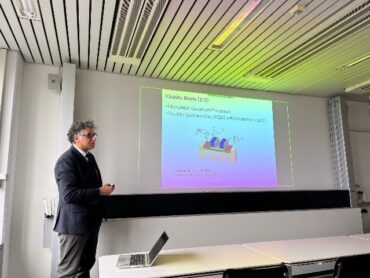Qubit-Size Low-Power Cryo-CMOS ICs for Monolithic Quantum Processors
Unveiling the Building Blocks of Quantum Processors: A Look at Prof. Zito’s Lecture
This report summarizes a captivating lecture by Prof. Domenico Zito, titled “Qubit-Size Low-Power Cryo-CMOS ICs for Monolithic Quantum Processors.” Held on June 14th, 2024, at the Solid State Circuit Switzerland Society Lecture (Gloriastrasse 35, Zurich, Switzerland), the lecture attracted a noteworthy audience of 15 participants, generating insightful discussions.
Tackling Challenges in Quantum Processor Development
Prof. Zito’s lecture went in depth into the crucial challenges of the creation of monolithic quantum processors which hold immense potential for revolutionizing computing power, but their implementation faces significant hurdles. The lecture shed light on the innovative solutions being developed to overcome these obstacles.
The Power of Integrated Quantum Devices
Prof. Zito presented a compelling approach involving the integration of quantum devices with control and readout circuits fabricated using FDSOI CMOS technology. Notably, these circuits operate at incredibly low cryogenic temperatures (around 2 Kelvin). This innovative combination is considered a key building block for realizing future monolithic quantum processors.
A Global Pursuit: Attracting Attention Across Industries
The development of efficient low-power cryo-CMOS ICs for monolithic quantum processors has garnered significant interest within the academic and industrial communities worldwide. Prof. Zito’s lecture highlighted the collaborative efforts underway to bring this revolutionary technology to fruition.
Engaging Discussions and the Road Ahead
The lecture sparked lively discussions among the 15 participants, with in-depth questions exploring the technical nuances and potential applications and difference with the initiatives in Switzerlamd. Prof. Zito’s expertise and the interactive nature of the event fostered a deeper understanding of the exciting advancements in quantum computing.
– Domenico Pepe

